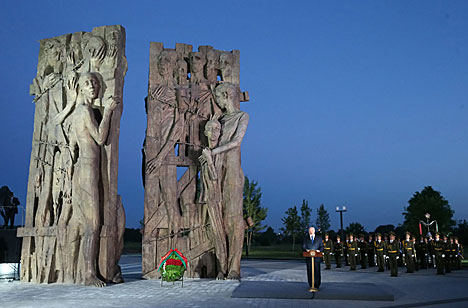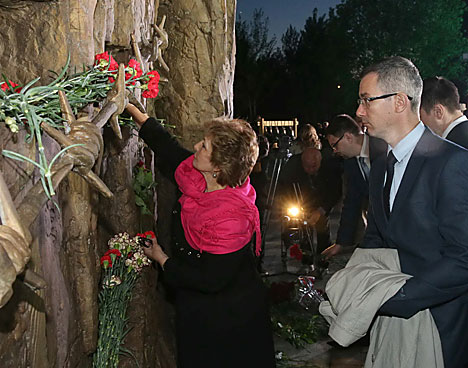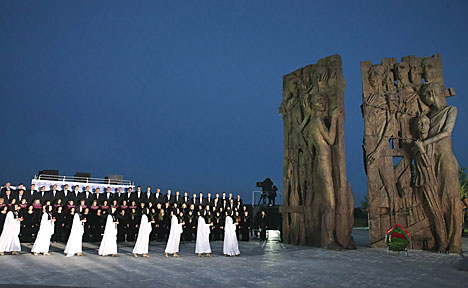70th anniversary of the Great Victory
Lukashenko: Belarus venerates and remembers victims of the Great Patriotic War
 MINSK, 23 June (BelTA) – Belarus venerates and will always remember victims of the Great Patriotic War, Belarus President Alexander Lukashenko said at a ceremony to open the Trostenets Memorial on 22 June, BelTA informs.
MINSK, 23 June (BelTA) – Belarus venerates and will always remember victims of the Great Patriotic War, Belarus President Alexander Lukashenko said at a ceremony to open the Trostenets Memorial on 22 June, BelTA informs.
“22 June 1941 is a tragic date for our people. We mark the start of the war as Remembrance Day of Victims of the Great Patriotic War. Today we have gathered to open this grand monument erected to commemorate the people who met a sacrificial death from the hands of the Nazi executioners,” the head of state underlined.
According to the President, the biggest death camp in the former Soviet Union was located here, in the neighborhood of the Belarusian village Maly Trostenets. More than 200,000 people were killed here. Among them were not only war prisoners and partisans; there were also civilians, i.e. old people, women, children.
 “The heart shrinks with pain when you think of the atrocities and crimes of the Nazis against humankind. People of various nationalities and confessions were brought here in packed echelons. Among those people were not only our compatriots but also people of other European countries – Poland, Germany, Austria, Czechoslovakia. It was a dire death conveyor. Mass execution took place in the area of Blagovshchina, bodies were burnt in the area of Shashkovka,” Alexander Lukashenko said.
“The heart shrinks with pain when you think of the atrocities and crimes of the Nazis against humankind. People of various nationalities and confessions were brought here in packed echelons. Among those people were not only our compatriots but also people of other European countries – Poland, Germany, Austria, Czechoslovakia. It was a dire death conveyor. Mass execution took place in the area of Blagovshchina, bodies were burnt in the area of Shashkovka,” Alexander Lukashenko said.
Anticipating the outcome of the war, the Nazis started removing the traces of their crimes in autumn 1943. They dug out the remains of those killed to burn them on wooden racks. An estimated 6,500 prisoners were shot and burnt here three days prior to the liberation of Minsk.
“The land we are standing on is soaked with tears and blood of hundreds of thousands of innocent people. It still keeps their ashes,” the President of Belarus stressed.
He suggested observing a one-minute silence to pay tribute to the memory of all the victims.
 “There are wounds that time cannot heal. Countless victims of the Great Patriotic War are one of such open sores. The years of the Nazi occupation left an indelible mark on our land. Burnt villages and destroyed cities, inhuman “death factories” were all aimed at destroying our nation. We should not forget that in Belarus there were about 250 camps for Soviet war prisoners, 350 detention facilities for civil population, 186 Jewish ghettos,” Alexander Lukashenko said.
“There are wounds that time cannot heal. Countless victims of the Great Patriotic War are one of such open sores. The years of the Nazi occupation left an indelible mark on our land. Burnt villages and destroyed cities, inhuman “death factories” were all aimed at destroying our nation. We should not forget that in Belarus there were about 250 camps for Soviet war prisoners, 350 detention facilities for civil population, 186 Jewish ghettos,” Alexander Lukashenko said.
The head of state noted: “We venerate and will always remember the victims of that war. The construction of the Trostenets Memorial is a matter of honor for Belarusians.”







 print version
print version make home page
make home page add to bookmarks
add to bookmarks

